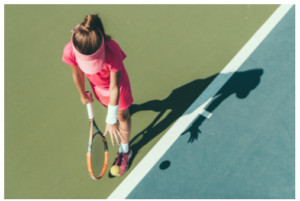Anxiety
It seems that the psychological term anxiety is a state of being that many people are realizing affects them in different ways. Whether it's because we are in a global pandemic, or that schools are teaching remotely or that there is civil unrest, most people are somehow affected by this leading condition in our country. Today, I want to focus on Performance Anxiety. This is the type of anxiety that affects children and adults alike and is defined as being a fear that develops from the fear of failure. This past month, I had the distinct honor to interview Cristie Pearce Rampone and Dr. Kristine Keane for my podcast about all things raising kids for success in sports and in life. One of the issues we didn't get to cover is based off a chapter of their new book, Be All In, titled Beating Performance Anxiety. So, today's article will be all about this specific type of anxiety and how to overcome it.
Parenting a child with performance anxiety
There are a number of kids that I have worked with that have experienced performance anxiety in sports, on stage, on debate teams or even just in class.
It is usually obvious when someone is experiencing performance anxiety. And to be nervous before a big game or speech is generally considered understandable. But if your child is consistently looking to you when they make a mistake, plays better in practice than in games, or seems to look for excuses why they can't participate in the activity this may be beyond what is typically expected.
Before I get into what is helpful to do as a parent, I am going to touch briefly on what is not helpful to your child who may have performance anxiety.
- Don't provide unsolicited help as it send the message that you believe they are incapable on their own
- Don't provide sideline or backstage coaching
- Don't get involved with coaches, refs or teachers unless you really feel you must for safety issues. Otherwise, let your child talk to them about issues they are having.
- Don't shield your child from constructive criticism or failure, doing so decreases their opportunity to grow and learn
- Be aware of your own anxieties and how they be hindering your child or affecting their anxiety
- Keep perspective on the big picture such as the whole team or the entire ensemble, kids will sense an increase in pressure if they know you are focused only on them
- Don't embarrass your child by yelling at them or doting too much on them, focus on specific positive feedback and reflect with them on whether they achieved the goal they had set for themselves
Okay, now that I mentioned the no-no's of parenting a child with performance anxiety, here are some ideas of what you can do to help reduce your child's performance anxiety and increase their confidence.
- Practice deep belly breathing- do it yourself, do it with your kid and teach them how important this skill in for anxiety, anger, and stress management
- Inner critic- have your child describe what their inner critic says to them. What are the nagging beliefs or criticisms that exist within? They need to become aware and then start talking back to that voice with replacement statements. Instead of, "I'm scared about..." replace that with "I'm excited for the opportunity to do..."
- Create mantras- this is an extension of getting bigger and louder than that loud inner critic. Have your child write down and say things like, "I got this. I can do this. Why not me? I know what I am doing." If they do this consistently and often, it will become automatic and that other voice fades.
- Be on time, be consistent, be prepared- structure and routine help a ton if anxiety in general. Be on time, or early, have things planned and packed and think through the week in advance. These strategies go a long way in establishing calmness, confidence and control.
- Be clear on the purpose of the activity that causes anxiety- kids that are going to put themselves out there should be clear what the greater purpose of what they are doing is. They need to know it's about others, or helping or spreading a message beyond just themselves.
These tips were curated from a clinical and sports neuropsychologist and America's most decorated professional soccer player- male or female- of all time. Together, they guide parents on parenting both on and off the field. The book again is Be All In and is excellent.
Happy Parenting!
